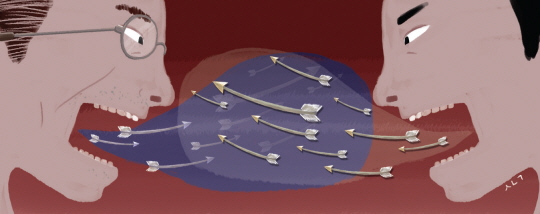We are living in an in a hate-filled society which the recent newly coined words bear witness—words that demean others in society. The head of a research center concerned with changes in social mental states writes in the Kyeongyang magazine on what he sees happening in society.
What are we talking about with this hatefulness he sees in society? It's a feeling of disgust which one feels coming into contact with certain things or people that triggers a revulsion. It's a concern with the emotional revulsion and not with the rational part of our makeup, consequently one has difficulty reasoning with the feelings experienced. We are dealing with subjective feelings and not with intellectual opinions that come from our reasoning, right or wrong.
Some people who hear the words ox blood soup, the saliva begins to flow and others a feeling of queasiness in the stomach. Which shows we are dealing with a subjective matter. When we have this situation and face it with an open mind and understand it as a personal subjective feeling there is no social problem. When this is not the case and express this hatefulness both in words and actions, hatefulness spreads in society, now especially on the internet that becomes a serious threat to society.
Why is this the case in our present society? We have always had a situation where subjective feelings of likes and dislikes were experienced with objects and people but it was managed with our ethical codes of conduct. However, recently we have come to the understanding that we have the right to express our hateful feelings.
Democratic education considers important our individual rights and the expression of these rights: in government, in department stores with the customers and salespersons, restaurants, apartment buildings with the security persons. We have many rolls and postions in society but the reason for the problems are all pretty much the same. Our rights are primary; we forget the obligation to respect the other and our place in community.
No blame on the democratic education received but our place in community is forgotten and the individual becomes primary. We see this in the dramas, movies, novels, not only in Korea. In the United States coming into the 21st century, we see Sex and the City as the dramas that are popular. The community is not as important as the individual and their tastes. What in the past was considered selfish by society today is a natural right and this is now seen worldwide. Jean Twenge has written a book Narcissism Epidemic which she considers spreading wildly.
He sees the cure for this in three ways. We first need to change our perspective. It's not to change our tastes of what we like or dislike for that is a natural outcome of being human but rather wanting it excessively to become part of society. Because we don't like ox blood soup, we don't want everybody to do the same. Secondly, is to examine ourselves. Because someone was hateful to me doesn't mean I should return that hate. Opposed for opposition sake tells us who we are. Thirdly, efforts to have an open mind, magnanimous. Even though we feel disgusted and hatefulness emotionally, it does not become a social problem. As believers, we should be open to embracing all in society absent the hate speech that is so common.
